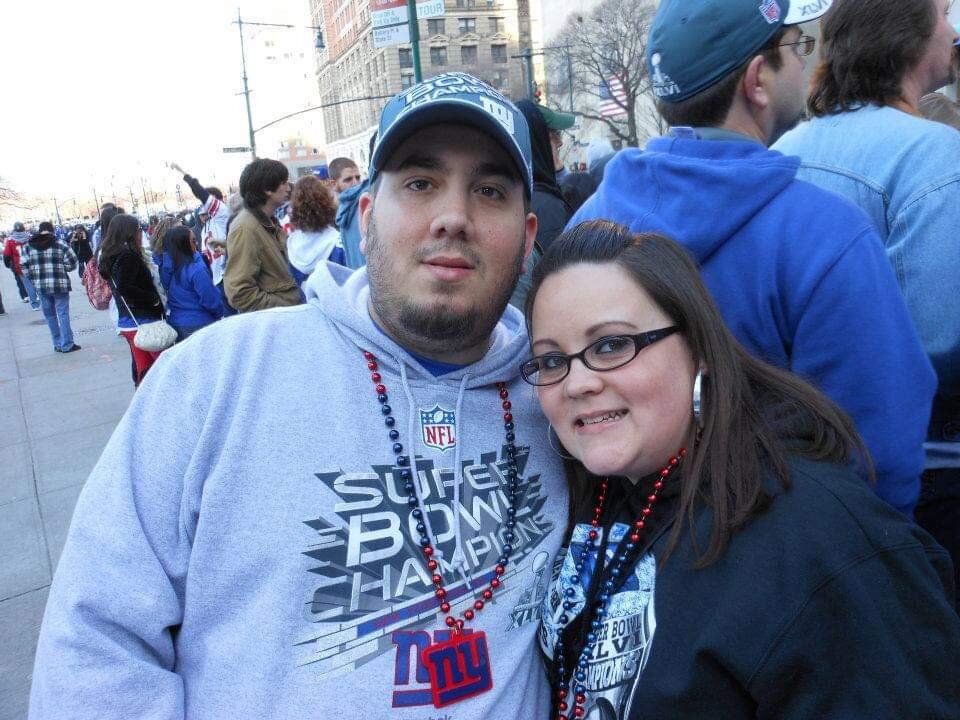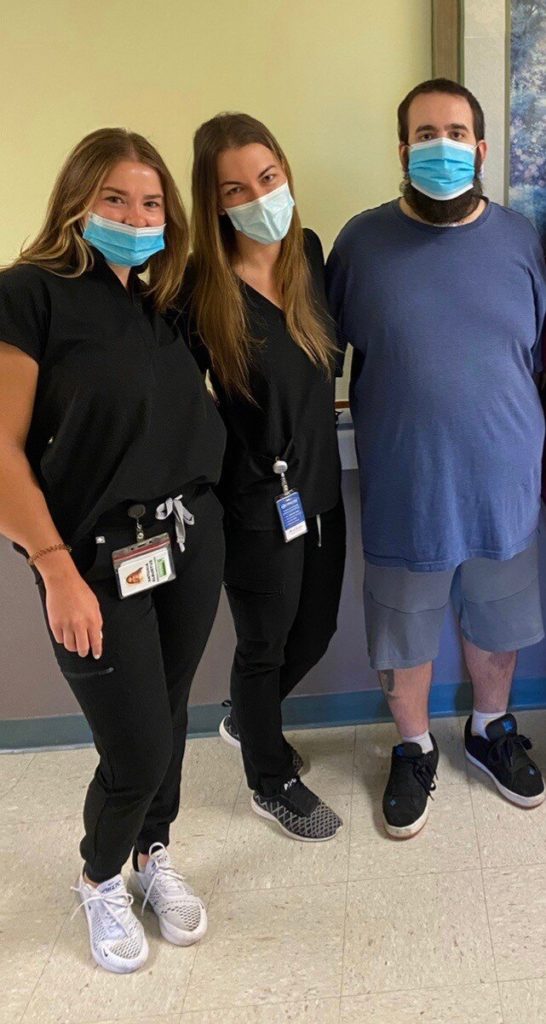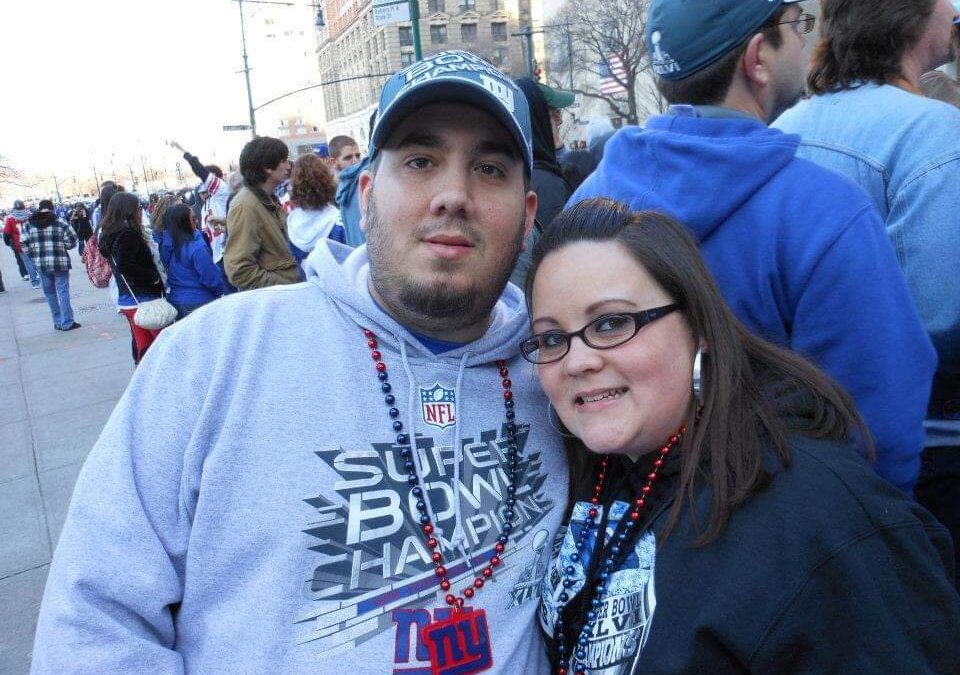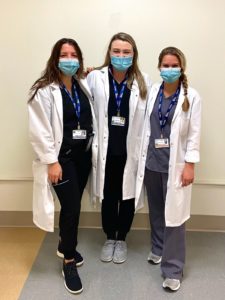Updates to this article are below in RED and published on December 20, 2021. enjoy!
Following his bout with Covid-19, Rob Callas returned to work in April 2021 even after suffering an ankle fracture November 2020 he was “back on the forklift right away.” He gets tired at the end of the day, mostly from the daily commute on the Brooklyn-Queens Expressway. Covid and the associated stroke has left him some nerve damage in his left arm & thumb.
Rob started Weight Watchers around the time he returned to work and has since lost over 80 pounds! “My knees are better, and I have regained my stride. I walk a lot using the Under Armor Map My Walk App and ride my exercise bike while using resistance.”
Rob does struggle with anxiety and PTSD related to his lengthy battle with Covid. He sometimes feels “survivor’s guilt” at times, a side-effect which more and more Covid survivors are beginning to acknowledge.
Rob bravely continues to reiterate that Covid “doesn’t have to be a death sentence. You can recover.”
Rob and Melissa are looking forward to the holidays and spending time with family. “Then, back to work” Melissa now works days at Staten Island Hospital so we can be on the same shift. “The whole Covid experience made us closer.”
The story of Staten Island’s own 35-year-old Robert Callas is one of a real-life COVID-19 survivor.
Rob and his wife Melissa had just wrapped up a peaceful and quiet holiday season spending lots of time with family & friends. A native New Yorker, Rob has spent the last 15+ years as a mechanic for Amtrak.
In early March, Rob started feeling sick, making multiple trips back and forth to urgent care and was diagnosed with a bad cold and flu. He became increasingly sick and began to miss work as he started experiencing coughing fits & gasping for air.
On the morning of March 30, 2020, Rob had such difficulty breathing that he went to Staten Island University Hospital (SIUH). He was swabbed and put into a glass room and was found to be positive for COVID-19. The last thing he remembers is being flipped onto his stomach, which is a technique utilized in an attempt to best utilize his oxygen intake. Rob texted Melissa, who is a patient care associate at the hospital, “don’t let me die” before being sedated. Rob was put into a medically induced coma and the next thing he knew; it was late April.

On May 15th, Rob was discharged from SIUH and sent to Carmel Richmond Healthcare and Rehabilitation Center with a lengthy list of complications directly related to his bout with COVID, including recent cardiac arrest, pneumonia, and deep vein thrombosis in his legs. Rob was on continuous oxygen through his tracheostomy (an artificial airway) and was using a Passy Muir speaking valve, which helps the production of speech for someone with a tracheostomy.
In addition to these diagnoses, Rob has also developed dysphagia (difficulty safely eating and drinking by mouth), and dysphonia (trouble using his voice to speak because his artificial airway redirected airflow) and he required the services of Speech-Language Pathologists to treat these conditions. He was admitted to Carmel Richmond with allowances for puree foods and thickened liquids, however, his nutrition and hydration were mainly being provided via a feeding tube.
“Nobody is going to forget him,” said Jaime Faitlowicz, MS, CCC-SLP Language Fundamentals Regional Manager and one of Rob’s treating Speech-Language Pathologists. “Rob’s case hit close to home because we are all around the same age. Once Rob realized that everyone was here to help him and that we are all going through this together, it meant that much more to him. It motivated him to get better and back home. Rob was the youngest patient in the building. We treated him like family.”
Language Fundamentals’ Antonia Alburtus, CFY-SLP added perspective as a young clinician amid a surging pandemic with so many unknowns. “Robert was inspiring for me. He is so trusting as a person, it motivated me to help him.” She went on to say that the whole episode was scary as “This could be anyone. Every day was a battle.”
The Rehab team, operated by Long Island-based TheraDynamics Rehab, at Carmel Richmond came together in collaboration and set incremental goals that would be achievable. Rob became more motivated to work hard and meet his goals as he saw his achievements being made with all of the therapy disciplines.
In early June Rob had a setback. A bad seizure forced him to be re-admitted to SIUH. He had bad memories of the hospital and was afraid that he would never leave.
According to Faitlowicz, “Rob was nervous to leave his new-found rehab family to go to the hospital. I remember him tearing up as Dr. Tirado pleaded with him to undergo a neuro examination due to the new-onset seizures; Rob had come so far with us by his side, he was concerned he may have a setback if he returned to the hospital. One of the convincing factors that led him to agree to be examined at the hospital was when I had advocated on his behalf with Dr. Tirado to have the ER schedule the removal of the feeding tube. At that point in time, he was tolerating trials of a mechanically altered diet of chopped foods and thin liquids with close monitoring by the SLPs, MD, and the nursing staff of his vital signs throughout each day to ensure there were no spikes in his temperature of >2 degrees and no signs or symptoms of respiratory distress. We wanted him to have at least one good thing to look forward to if he had to go back to the hospital.”

Language Fundamentals Speech-Language Pathologists Antonia Alburtus & Jaime Faitlowicz with Rob Callas
After returning to Carmel Richmond, the SLPs relied on utilizing multiple differential diagnosis methods to assess his swallow as instrumental examinations were not readily available during the worst of the COVID-19 pandemic. Through restorative speech therapy, he returned to his prior level of function for both speech and swallowing. Rob went from breathing artificially with mechanical ventilation, a tracheostomy, and a feeding tube, to having everything removed altogether. He progressed to breathing on room air and his diet returned to safely eating regular foods with thin liquids and is now speaking normally also.
On June 25th, Rob was ready to go home. Rob was discharged from Carmel Richmond to a chorus of cheers from the staff with his wife at his side. The team felt a sense of much-needed inspiration and success.
These days Rob counts his blessings each day. He has good days and bad. Rob and Melissa juggle a multitude of doctor visits and are especially grateful for Dr. Miguel Tirado, who has been following Rob since his discharge from Carmel Richmond. Being able to maintain a connection with the medical team at Carmel Richmond through Dr. Tirado has been a blessing. Rob continues to make progress physically as well – slow and steady every day.
He is grateful for all of the continued visits and well wishes from the staff from SIUH & Carmel Richmond, as well as the relationships he developed with Jaime and Antonia. They all text regularly and exchange words of encouragement. Rob considers them “more than just therapists, they treat me like friends.”
On good days, Rob and Melissa are happy to sit outside, go for walks, listen to music, and receive outdoor visits from friends, all while avoiding crowds. Rob says “The small places are what I enjoy. I am not comfortable in large places or around too many people.”
Unfortunately, Rob’s journey has not been an easy one. Roughly 2 weeks after returning home, Rob’s father succumbed to a lengthy illness. While Rob was at Carmel Richmond and his dad was at a different rehab facility, they were able to communicate via FaceTime on a few occasions. Rob was able to speak with his dad on the phone before he passed away but, sadly, was unable to say goodbye in person.
Rob’s battle with COVID-19 has taken an emotional toll, as well. He experiences anxiousness, bad dreams, triggers, and PTSD-like feelings. “I felt like even though everyone kept saying it’s going to be OK, I just wasn’t sure. I lost so much time. I didn’t even know what time of year it was and questioned everyone and everything. I feel like I saw the bright light, but something pulled me back like I wasn’t ready to go yet.”
In speaking to Rob for this story, it has been a pleasure getting to know him. He is hopeful and optimistic and loves to talk sports. He remains hopeful that he will also be able to return to work in the summer of 2021.
Rob’s message is a simple one – “People still aren’t taking this seriously. I am not looking for pity. I am telling my story, so people know this is serious. It’s not going away & we need to take care of ourselves and others. COVID-19 doesn’t have to be a death sentence. You can get better if you do the right things. There’s nothing wrong with wearing a mask. It’s just common courtesy to other people.”



